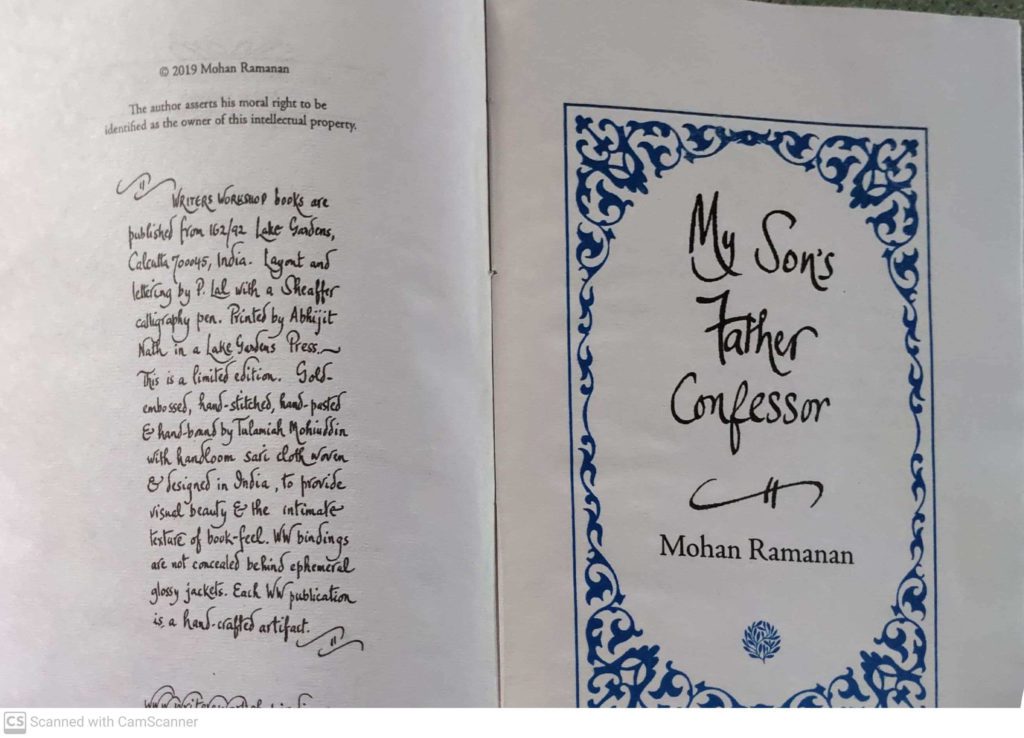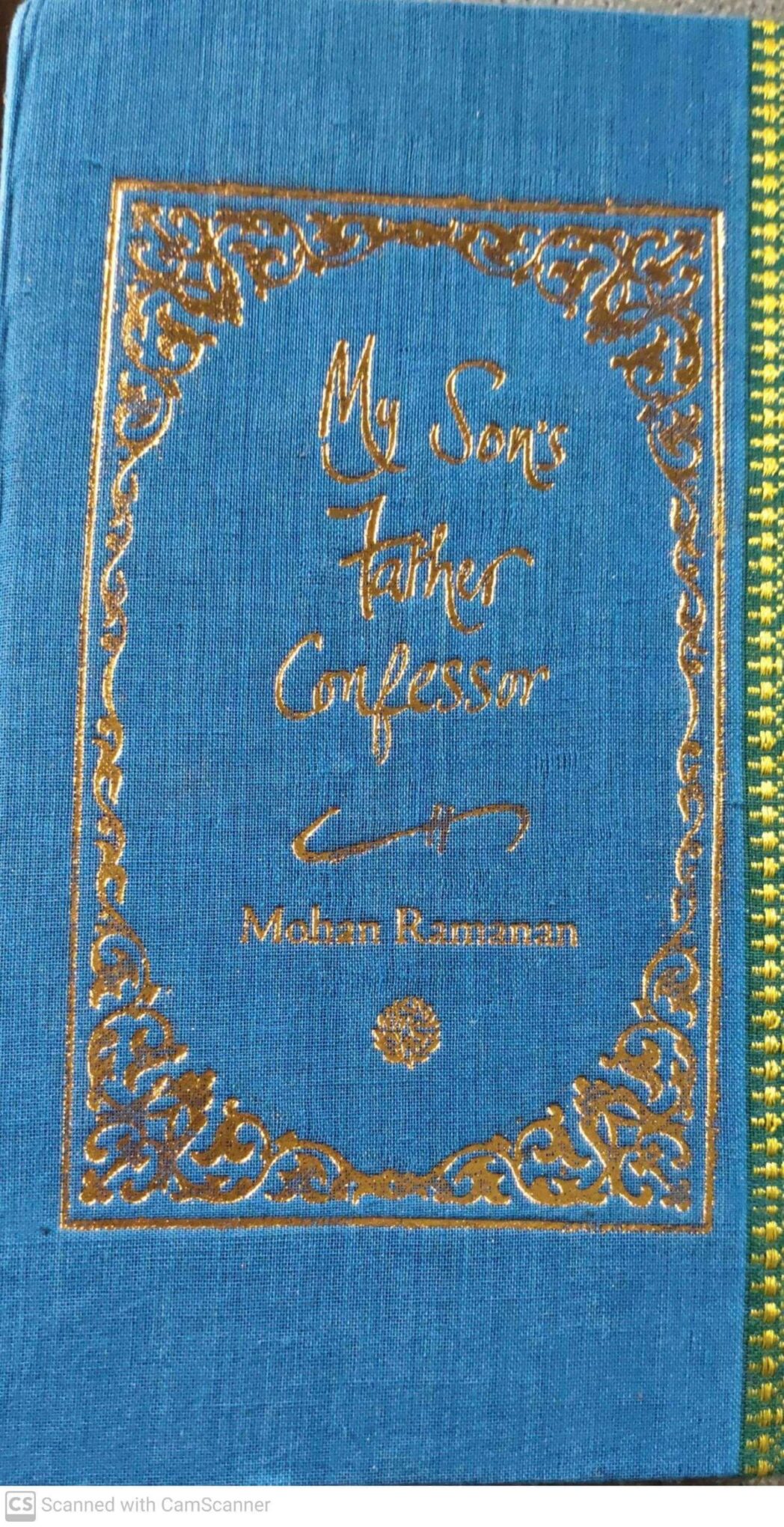Prof. K Sandhya reviews Prof. Mohan Ramanan’s anthology of poems, My Son’s Father Confessor. An exclusive for Different Truths.

The book, My Son’s Father Confessor, is an anthology of poems composed by Prof. Mohan Ramanan, a scholar, critic, musician, an academician, and a thorough gentleman to the core. An icon for humility and simplicity!
My Son’s Father Confessor is, as the poet himself says, partly autobiographical with an element of fiction. The poems spread a kaleidoscopic canvas of seven decades since 1949, the year of his birth and in short, the book projects an adequate scope to have glimpses into his entire life with its achievements and accolades and trials and tribulations.
A Guide to Life
The book has been addressed to his son, Bharat, as a ‘Treatise on Life Skills and Culture and Heritage’ – a guide to lead life as per traditions, familial culture, and ethics. This serves as a ‘Management Guide’ to all the youngsters. They must know their roots and grow fruitfully without losing the grip with the set of norms they have been nurtured with as reason and meaning back up all such thumb rules. It is interesting to know the significance of the name Bharat.
The book has taken ten years to complete itself as the poet has had to encapsulate seventy years of his life with its bitter and sweet experiences.
In the ‘Preface’, the poet has explained his intent of writing these confessional poems…
In the ‘Preface’, the poet has explained his intent of writing these confessional poems for his son “because as a member of the new generation, you were different from me as one would want it and this difference made me think about my life, my values and relationships – to clarify things to myself.” What an honest confession! In everyone’s life this gap does exist between two generations and the poet appears so earnest and sincere in his transparent express on that one can empathise with him, while facing similar challenges thrown by destiny, which is inscrutable.

Didactic Purpose
He asserts, “I cannot ask you to become a clone of myself but your partly deracinated nature…can be saved by the balm of poetry and these poems have that didactic purpose. They are conversations I have with myself and you, and sometimes I let you overhear my thoughts.” At the very outset he reminds his son, “… patrimony is the privilege of one’s sons and along with rights come duties.”
The ‘Prologue’ discloses the poet’s intention to lighten his heart by sharing the pent-up emotions, experiences, events that have over weighed him and he counsels his son and the youth, in general, about various aspects of life.
There are 84 poems, among which are eight prayers, invoking God’s guidance to lead him…
There are 84 poems, among which are eight prayers, invoking God’s guidance to lead him with his mission of writing uninterrupted with all his nervous debility and these prayers reinforce the devout nature of Prof. Ramanan.
Direct Advice
In ‘Thus Spake Sanjaya’ he gives direct advice to his son, and these are all like commandments, if followed religiously, makes a man healthy and hygienic besides upright and virtuous. The professor says, “these sayings are my versions from the Dharma Shastras, and I have culled them and put them in the voice of Sanjaya, my alter ego. I would have you imbibe these lessons, which if I were to speak to them in my own voice, would fall on you with no impact. You would be deaf to them like the blind Dhritarashtra.”
The book spans across four generations…
The book spans across four generations, the poet’s grandparents, parents, his own and that of his children. The local milieus they lived in, the problems, feuds, unpleasantness, inadequacies faced, combated, and won. And the slow pace in which life mellowed – all captured vividly. Prof. Ramanan’s graphic memory for minute details surprises readers in many places, especially his alacrity with names of persons and places!
His subtle comments about academics and the related issues mirror the sad situation prevailing in the so-called elite intellectual gatherings.

Courage and Confidence
The poems are short but crispy and pregnant with reflective meaning. And once can correlate with his experiences. A mountain of courage and confidence is required to be so confessional and open hearted. And my Guru is one such mountain of knowledge, scholarship, music, goodness, humility, and simplicity.
This is a book which is a pleasure to read, to dwell into self, and introspect.
This is a book which is a pleasure to read, to dwell into self, and introspect. In the poet’s own words these “are my confessions, reflections on life, on love, on teaching, academic life, on music” with a plea to nurture and save the roots that one sprouts from.
Visual sourced by the reviewer





 By
By

 By
By
 By
By